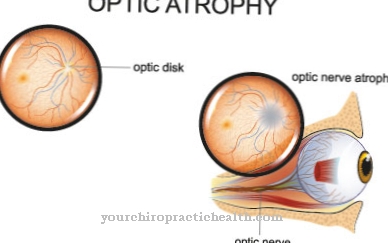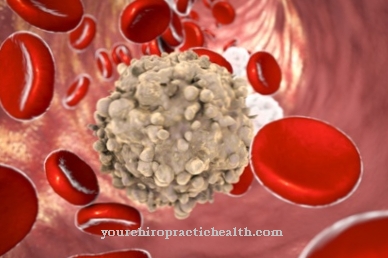Almost everyone has already experienced it: Tension headache is an annoying condition that severely affects the quality of life, especially in chronic cases. The reasons for this are varied and not yet fully explored in detail. Still, there are effective treatments that can significantly relieve tension headaches.
What is tension headache?

As Tension headache This describes a pressing and dull pain that radiates from the neck over the entire head and is perceived in its intensity as light or moderately severe.
However, the term tension headache is only correct if there are no causal diseases of the brain, food intolerance or poisoning as a trigger. In contrast to such secondary headache with a clear cause, tension headache is also referred to as primary headache.
There are two forms of tension headache: One speaks of episodic tension headache when the pain attacks occur at least ten times a year, but not on more than 180 days per year. The chronic tension headache occurs for at least 15 days a month, for at least six months in a row, and represents a severe impairment of well-being.
causes
The causes for Tension headache can be different. Poor sitting posture or overexertion and chronic tension of the masticatory muscles are possible. Uncorrected ametropia or the wrong visual aid can also contribute significantly to the development of tension headaches.
In the case of computer work, an inferior quality of the screen used should also be considered as a trigger. Psychological factors also play a role: constant stress, pressure to perform and bullying are reliable sources of tension headaches, especially if the resulting inner restlessness is not regularly relieved through sufficient physical exercise and relaxation.
Tension headaches are made worse by stressful influences such as constant noise and flickering artificial light. Often there is also a hereditary component that leads to an increased tendency towards tension headaches.
Symptoms, ailments & signs
The tension headache is often described as oppressive. For those affected, it can feel like there is a weight on their skull. It is also possible that the tension headache is perceived as pulling, but typically not as tearing or stabbing. Instead, this type of headache is characterized by a dull, mild to moderate pain. The pain pulsates and does not wander.
Some patients suffer from the pain for several days at a time, while other patients experience episodes that last half an hour or a few hours. The tension headache occurs on both sides of the head and can be felt throughout the skull. In addition, you may experience mild nausea, sensitivity to light, and other mild symptoms affecting the autonomic nervous system. Tension in the shoulder and neck muscles can also occur. However, some patients do not have any additional symptoms.
Chronic tension headaches occur on more than half of the days of a month for at least six months. In contrast, acute or episodic tension headache is present on less than half of the days. Symptoms do not get worse if the person moves easily or performs everyday tasks. Nevertheless, the tension headache can affect the quality of life.
Diagnosis & course
Anyone who suffers from recurring headaches should consult a doctor to clarify the cause beyond doubt. The doctor will ask detailed questions about the type, frequency, and regularity of the headache.
If the patient's information is inaccurate, he will ask him to keep a pain diary for a limited period of time, in which it is recorded exactly when, under what circumstances and in what intensity the pain occurs. A skilled doctor will recognize the pattern of a typical Tension headache.
A palpation examination of the neck and masticatory muscles can also provide information on the diagnosis of tension headache. Regarding the long-term course, an episodic tension headache can become chronic if left untreated if there is a hereditary predisposition and the respective trigger is not eliminated.
Complications
Tension headaches are usually unproblematic. However, if the symptoms recur, it can lead to serious complications. Regular tension headaches can turn into migraines in the long run. This is associated with gastrointestinal complaints and other symptoms. In the long term, the symptoms can also lead to depression and anxiety.
If there are already mental illnesses, tension headaches indicate a severe course. Often the triggering suffering intensifies and has a negative effect on the quality of life and well-being of the person concerned. At the same time, tension and visual disturbances can occur. When treating tension headaches, the risks lie in incorrect or inadequate therapy. Drug treatment can, under certain circumstances, exacerbate the symptoms.
In addition, ibuprofen and co. Can cause side effects and interactions such as headaches and pain in the limbs, complaints of the gastrointestinal tract and skin irritations. In the long run, such preparations cause kidney and liver damage as well as diseases of the cardiovascular system. Complications are unlikely with other therapeutic measures such as meditation, massage or autogenic training. It is advisable to work out the treatment measures together with a doctor and, ideally, to implement them under medical supervision.
When should you go to the doctor?
Tension headaches can be self-diagnosed quickly because they affect those affected regularly and over time they can classify it and treat it themselves with light painkillers. If it is known that it is a tension headache, no visit to a doctor is required. However, changes, an increase in the intensity of the pain, or the emergence of a tension headache all indicate that something has changed in the body. Only a doctor can clarify where the symptoms are coming from or what the change in the usual tension headache is due to.
It can be poor posture, but it can also be organic issues that can be treated to relieve tension headaches.Headache can have various causes, often it is just a symptom of an underlying illness - albeit a very stressful symptom.
Even if the patient is familiar with the tension headache and has had it for a long time, a doctor should be consulted if pain medication has to be taken regularly because of this. These put a permanent strain on the internal organs and thus damage health, even if they are often the only really useful measure for immediate relief. To combat this problem before it actually causes damage, tension headache should never be tolerated, even if it seems reasonable to assume that it is simply caused by stress and tension.
Treatment & Therapy
The treatment options for Tension headache are as diverse as its causes. If they are external or mechanical in nature, it is often enough to remove the trigger to get rid of the tension headache: New glasses, a conversion of the workplace (better chair, optimal screen) and the removal of stressful sources of light and noise bring them to life Cases a definite improvement.
If the reasons for the tension headache are psychological, the exact triggers should also be considered here. Anyone who is constantly under stress should reduce their workload or simplify work processes through reorganization. The solution to any bullying situation should also be tackled quickly.
In any case of tension headache, it makes sense to learn relaxation techniques: Autogenic training, meditation and biofeedback help to loosen nerves and muscles and to optimally bring the blood circulation into the flow. In addition, a body therapy such as the techniques according to F.M. Alexander or Moshé Feldenkrais are recommended.
In this way, the correct use of the muscles is practiced and unnecessary tension is avoided. Drug treatment of tension headache should only be done after consulting a doctor and to the smallest possible extent.
You can find your medication here
➔ Medicines for headaches and migrainesprevention
Who of the emergence of Tension headache If you want to prevent, you should start regular endurance training, which supplies the muscles with oxygen and increases blood flow. It is also useful to keep the spine flexible through gymnastics or yoga so that uncomfortable hardening and the resulting tension headache cannot arise in the first place.
Aftercare
A tension headache does not necessarily require follow-up care, although in many cases this is significantly limited or not even available to the person concerned. For this reason, the person affected should ideally see a doctor very early. Self-healing can only occur to a limited extent.
Most of those affected depend on medication that can relieve the symptoms. The person concerned should note that these should be taken regularly and in the correct dosage. If you have any questions or are unclear, you should first consult a doctor. Measures of physiotherapy and physiotherapy are also very useful.
The person affected can repeat many of the exercises in their own home and thereby alleviate the symptoms as well. In general, stressful activities should be avoided, with daily support from other people being very important. Contact with other people affected by this disease can also be useful, as this leads to an exchange of information that can make dealing with the disease easier.
You can do that yourself
In order to improve well-being and build a good quality of life, it is advisable to use relaxation techniques in the case of a diagnosed tension headache. Autogenic training, mental techniques, yoga or meditation can be applied and used independently in everyday life by those affected. In addition, there is a wide variety of courses that can be booked for improved relaxation.
If the person concerned notices ruminations or experiences a stressful everyday life, optimization and changes are necessary. Stressors of any kind should be reduced and cognitive patterns can be transformed. If this succeeds as part of self-help, the symptoms are often alleviated. For a large number of those affected, initial support from a therapist helps. Training and techniques for dealing with buzzing thoughts help alleviate the process. In the further course, those affected can also use the techniques they have learned outside of therapy if necessary.
In addition, sleep hygiene must be optimized. The daily routine should be routine and adapted to the needs of the body. Restlessness, conflicts and hectic rush are to be avoided. If states of cognitive overload arise, breaks should be taken at the same time and sufficient rest should take place. Checks also include food intake, adequate exercise outdoors, and avoidance of harmful substances such as nicotine and alcohol.



.jpg)
.jpg)

.jpg)

















.jpg)



